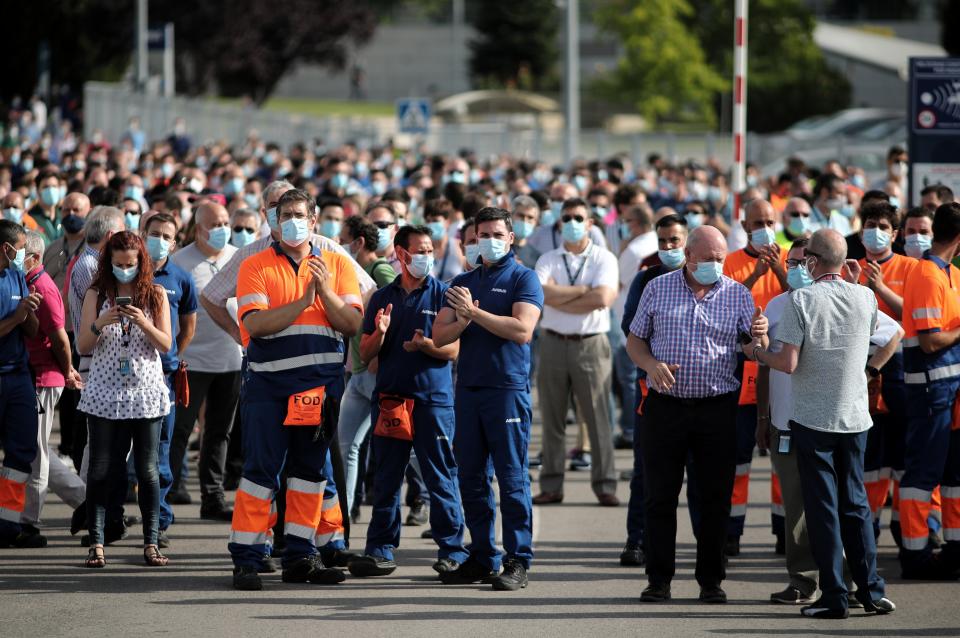What to watch: EU unemployment hits 15 million, Lloyds and Shell losses, carmakers' woes

Here are the top business, market, and economic stories you should be watching today in the UK, Europe, and abroad:
EU unemployment passes 15 million as rate rises to 7.1%
The official unemployment rate ticked upwards to 7.1% across the EU and 7.8% in the eurozone in June, new figures show.
Data published by Eurostat, the EU’s statistics office, on Thursday showed the seasonally-adjusted unemployment rate edging one percentage point higher in the EU and eurozone as the pandemic has hammered European economies.
The figures mean more than 15 million people were classed as jobless in June, with almost 12.7 million in the euro area. It marked an increase of 281,000 on May figures for the EU. The EU youth unemployment rate hit 16.8%, up from 16.2% the previous month.
Bert Colijn, senior eurozone economist at ING, said it was “remarkable” the figures were not higher. But he said the data was “artificially low,” reflecting both short-time working and government job schemes on the one hand, and the way the stats are measured on the other.
Around a fifth of workers in many countries are on short-time work schemes, according to Colijn, limiting lay-offs.
The figures also measure only people actively seeking work in the past month. Eurostat noted: “A significant part of those who had registered in unemployment agencies were no longer actively looking for a job.”
Colijn expects unemployment to keep rising despite lockdowns easing, with lower output, more people actively seeking work and the wind-down of job protection schemes taking a heavy toll.
Lloyds Q2 losses as £2.4bn set aside for bad loans
Lloyds Bank (LLOY.L) shares slid more than 8% as it joined the roll-call of banks setting aside billions more to deal with bad loans as a result of the COVID-19 pandemic on Thursday.
The bank said it had set aside an extra £2.4bn ($3.11bn) to cover an expected rise in the number of credit cards, mortgages, and loans going bad as a result of the crisis. Analysts had expected Lloyds to set aside £1.5bn.
“We have seen the UK economy deteriorate since the first quarter,” chief executive António Horta-Osório said on a call with journalists.
The loss provisions weighed on Lloyds’ performance and pushed it to an unexpected half-year and quarterly loss. The bank made a pre-tax loss of £602m in the first six months of 2020 and lost £676m in the second quarter alone. Analysts had been expecting a pre-tax profit of £42m for the first half.
Shell suffers £14.1bn loss as price crash forces write-down
Royal Dutch Shell (RDSB.L) suffered $18.3bn (£14.1bn) of losses in the second quarter as the coronavirus hammered demand for oil and gas, forcing a record write-down in the value of its assets.
A bleak outlook for future prices for the Anglo-Dutch company amid the global economic crisis saw it confirm $16.8bn in post-tax impairment costs on Thursday.
But its shares were down only 0.5% in London in early trading, as its adjusted earnings, which strip out such charges, were better than expected. It made $600m in the second quarter, down 82% year-on-year, but analysts had expected $674m losses.
Shell highlighted “very strong crude and oil products trading,” as well as lower operating costs, partially offsetting lower oil and gas sales, lower margins on its refining business and higher well write-offs.
Russ Mould, investment director at AJ Bell, noted: “Under the circumstances Royal Dutch Shell’s latest results could have been a lot worse.”
European stocks dip despite Fed vow to ‘use all its tools’
European stocks opened lower on Thursday, despite the Federal Reserve repeating a pledge to use the “full range of tools” to help the US economy recover from the coronavirus crisis.
Fed chair Jerome Powell’s vow to keep interest rates near zero for as long as it takes had lifted US stocks on Wednesday.
But Asian stocks closed lower overnight and it failed to lift leading European indices. Russ Mould, investment director at AJ Bell, said there was “disappointment” among investors at the Fed’s warning recovery depended on the course of the virus.
READ MORE: Fed warns recovery will depend 'significantly on the course of the virus'
A flurry of earnings data and concerns over infection rates in many countries also weighed on stocks.
In Britain the FTSE 100 (^FTSE) had opened flat but was down 1.5% by late morning. Germany’s DAX (^GDAXI) lost 2.4%, while in France the CAC 40 (^FCHI) was down 1.1%. The pan-European Stoxx 600 index (^STOXX) was down 1.2%.
What to expect in the US
US futures were also pointing to a lower open, with the political deadlock over topping up US unemployment benefits, which have propped up the economy, concerning investors.
S&P 500 futures (ES=F) and Dow Jones futures (YM=F) were trading 0.9% lower, and Nasdaq futures (NQ=F) were down 1% at around 6am eastern time.

 Yahoo Finance
Yahoo Finance 